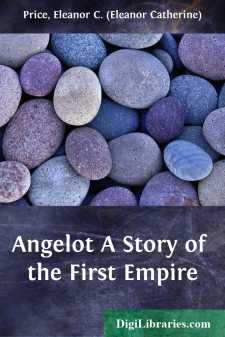Categories
- Antiques & Collectibles 13
- Architecture 36
- Art 48
- Bibles 22
- Biography & Autobiography 813
- Body, Mind & Spirit 142
- Business & Economics 28
- Children's Books 15
- Children's Fiction 12
- Computers 4
- Cooking 94
- Crafts & Hobbies 4
- Drama 346
- Education 46
- Family & Relationships 57
- Fiction 11829
- Games 19
- Gardening 17
- Health & Fitness 34
- History 1377
- House & Home 1
- Humor 147
- Juvenile Fiction 1873
- Juvenile Nonfiction 202
- Language Arts & Disciplines 88
- Law 16
- Literary Collections 686
- Literary Criticism 179
- Mathematics 13
- Medical 41
- Music 40
- Nature 179
- Non-Classifiable 1768
- Performing Arts 7
- Periodicals 1453
- Philosophy 64
- Photography 2
- Poetry 896
- Political Science 203
- Psychology 42
- Reference 154
- Religion 513
- Science 126
- Self-Help 84
- Social Science 81
- Sports & Recreation 34
- Study Aids 3
- Technology & Engineering 59
- Transportation 23
- Travel 463
- True Crime 29
Angelot A Story of the First Empire
Categories:
Description:
Excerpt
IN THE DEPTHS OF OLD FRANCE
"Drink, Monsieur Angelot," said the farmer.
His wife had brought a bottle of the sparkling white wine of the country, and two tall old treasures of cut glass. The wine slipped out in a merry foam. Angelot lifted his glass with a smile and bow to the mistress.
"The best wine in the country," he said as he set it down.
The hard lines of her face, so dark, so worn with perpetual grief and toil, softened suddenly as she looked at him, and the farmer from his solemn height broke into a laugh.
"Martin's wine," he said. "That was before they took him, the last boy. But it is still rather new, Monsieur Angelot, though you are so amiable. Ah, but it is the last good wine I shall ever have here at La Joubardière. I am growing old—see my white hair—I cannot work or make other men work as the boys did. Our vintage used to be one of the sights of the country—I needn't tell you, for you know—but now the vines don't get half the care and labour they did ten years ago; and they feel it, like children, they feel it. Still, there they remain, and give us what fruit they can—but the real children, Monsieur Angelot, their life-blood runs to waste in far-away lands. It does not enrich France. Ah, the vines of Spain will grow the better for it, perhaps—"
"Hush, hush, master!" muttered the wife, for the old man was not laughing now; his last words were half a sob, and tears ran suddenly down. "I tell you always," she said, "Martin will come back. The good God cannot let our five boys die, one after the other. Madame your mother thinks so too," she said, nodding at Angelot. "I spoke to her very plainly. I said, 'They cannot be unjust—and surely, to take all the five children of a poor little farmer, and to leave not one, not even the youngest, to do the work of the farm—come, what sort of justice is that!' And she said: 'Listen, maîtresse: the good God will bring your Martin back to you. He cannot be unjust, as you say. If my Angelot had to go to the war—and I always fear it—I should expect him back as surely as I expect my husband back from Lancilly at this moment.'"
Angelot smiled at her. "Yes, yes, Martin will come back," he said. But he shrugged his shoulders, for he could not himself see much comfort for these poor people in his mother's argument. If you have lost four, it is surely more logical to expect to lose a fifth. His father, a philosopher, would not have said so much as this to the Joubards, but would have gone on another tack altogether. He would have pointed out to them that the glory of France depended on their sons; that this conscription, which seemed to them so cruel, which now, in 1811, was becoming really oppressive, was the means of making France, under her brilliant leader, the most powerful and magnificent nation in the world. He would have waved the tricolour before those sad eyes, would have counted over lists of victories; and so catching was his enthusiasm that Joubard's back would have straightened under it, and he would have gone home—it happened more than once—feeling like a hero and the father of heroes....


